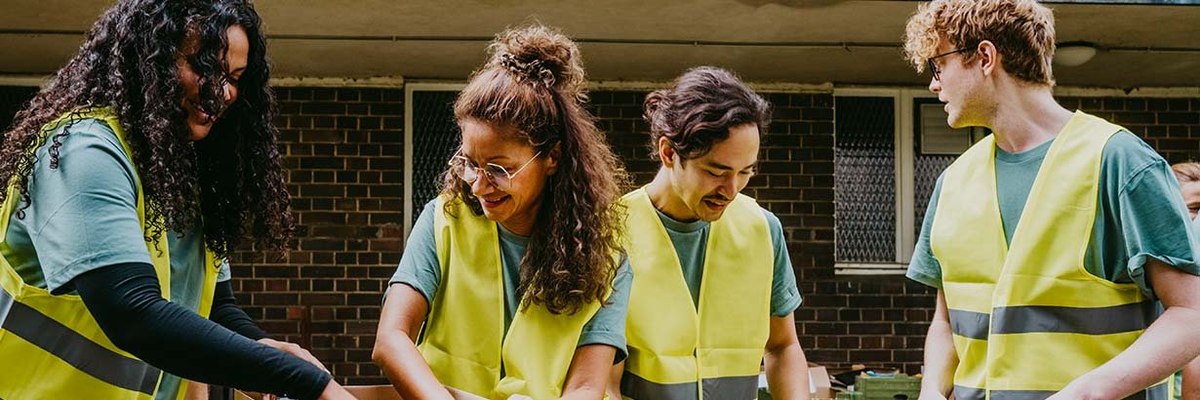Yet another bank holiday weekend – and this time we don’t have to worry about what we can do that won’t involve sitting on a motorway in a traffic jam or waiting for a train that may or may not turn up. And that’s because the man in whose honour the holiday has been declared has made it pretty clear what he wants us to be doing. Our new king wants us to be involved in helping those less fortunate than ourselves. So charities from across the UK, led by Bear Grylls, have launched the Big Help Out — one of the centrepieces of the celebrations for the coronation. The aim is to use volunteering to bring communities together and create what they describe as a ‘lasting legacy’ from the coronation weekend.
The Big Day for the Big Help Out will be bank holiday Monday, the day after the coronation. So the Big Question, inevitably is: will it work? Are you prepared to help out?
Grylls, who also happens to be the chief scout, said: “Volunteering has always been a huge part of what makes this country great — from families looking after evacuees during WWII to neighbours looking out for each other during the pandemic. But it’s not just in times of crisis that we step up. Volunteering — whether formal or informal — is what powers our communities from scout leaders to football coaches, collecting the shopping for an elderly neighbour to helping out at the school fete. The Big Help Out will put volunteering centre stage for a day and give people who want to volunteer easy ways to join in.’
Brendan Cox, the co-founder of the Together Coalition, said: “How we mark the coronation will reflect the kind of country we are. Along with the pageantry and parties, we hope an opportunity to volunteer will leave a long-lasting legacy in communities right around the nation.’
He is not alone in that. The former Conservative leader William Hague used his Times column to make the point that much of the congregation in Westminster Abbey will be made up of ‘community champions’ and recipients of the British Empire Medal, awarded for service to a local area: ‘ Young people from the Scout Association, Girlguiding UK, St John Ambulance and the National Citizen Service — some of the most valuable and inspiring organisations in the country — will be stewards and line the route.’
The role of monarchy, he says, is being ‘steadily redefined — drastically so from its Victorian and Edwardian days — to have leading, healing and action at the local level at its heart.’ But he’s not so sure about the role of our leading politicians and their influence on the many in their constituencies who play no such role.
Jon Yates, who runs the Youth Endowment Fund, has written a book in which he argues that the ‘common life’ that brought our grandparents together has vanished. We are now much less likely to join clubs and societies, and most of us increasingly only know people like ourselves: ‘Half of graduates have no friends without degrees. Most pensioners know no one under 35 (apart from their grandchildren). A fifth of (EU) Leavers and a quarter of Remainers have no friends who voted the other way. Half of us have no friends from a different ethnic group.’
Lord Hague believes these trends have become particularly pronounced as more of our lives have moved online, with an added push from Covid-19. In eight years, he says, the proportion of people who volunteer in their communities each month has fallen from 44 per cent to 34 per cent — that’s ‘more than four million fewer adults choosing to participate in some way. Not surprisingly, over the same period those who trust many of their neighbours have fallen by a similar proportion, while other surveys also show that many people believe local pride in their area is weaker.’
‘The effect on young people is tragic. Many now report they have more friends online than in real life, while surveys show they have fewer friends than in previous generations. Only 39 per cent of 16 to 24-year-olds identify very strongly with Britain; 10 per cent of them say they are lonely. That might not sound like a big proportion but it means that somewhere out there, in a bustling, crowded, fairly prosperous country, there are over half a million young adults who are so lonely they will confess that to a pollster. The numbers in the same age group who report anxiety and depression run into millions and have increased sharply in recent years.’
The think tank Onward has done research that shows young people are socially conscious and want to help society and the planet but a growing number believe they can do more ‘to improve society online than they can working together in their local communities’. Lord Hague believes this is largely an ‘illusion, in which posting an opinion on social media about climate change is preferred to actually going out to plant some trees, but it is an illusion that is getting stronger, more enveloping, more cloistering.’
So perhaps everything in this particular garden is not quite as rosy as Bear Grylls and The Big Help Out might suggest. Hague believes ‘something quite fundamental and deeply disturbing is going on here, with implications for almost every aspect of public policy.’ If we do not raise levels of participation, volunteering and mixing with each other it will be ‘increasingly difficult to level-up poorer areas, improve social mobility, maintain social cohesion, prevent a growing divide between elites and the rest, make common sacrifices in future crises … or even maintain basic voluntary services.’
The track record of politicians who have advocated what David Cameron called the Big Society is hardly inspiring. He established something called the National Citizen Service but came up against two obstacles. One, inevitably, was the money to pay for it but the other was, if anything, even more fundamental. It was what Hague describes as a ‘reluctance to call for anything compulsory in an age in which people have stopped associating their right to freedom with corresponding obligations and duties.’
Hague lists some of the measures that have been floated by various party leaders for inclusion in their parties’ manifestos for the next general election. They include a National Volunteer Reserve, a National Nature Service, a Biosecurity Citizens Army, a new online national portal for volunteering opportunities — and many more. All of them likely to attract their own share of approval and disparagement. But his parting shot will have left many of his readers with gaping jaws. Here’s how he put it:
‘The big question is whether we can ever brace ourselves for mandatory service.’
A big question indeed. It’s now 63 years since conscription came to an end in this country and it’s safe to say that few have mourned its passing. But not everyone. Even our defence secretary Ben Wallace, himself a former soldier, has ruminated on the appeal of some form of national service which would give the government powers to call up reservists in times of emergency. It happens in other European countries – and not just Greece. In Finland – the newest member of Nato – every male citizen aged from 18 to 60 is liable for military service. Our own Royal United Services Institute has suggested a more targeted and selective form of national service that would extend training and reserve status to far larger numbers than today.
When The Conversation website carried out its own research it found that most of those who had been ‘called up’ doubted that it could ever be brought back. Young people, they thought, were more ethnically and religiously diverse in contemporary Britain so they would be less likely to agree to such an imposition by the state. Most important, young people had not been subject to the same disciplines of family, school and community life as the national service generation. Those who approved of a new form of national service saw it as a way of instilling social discipline, rather than teaching young men how to fight.
So what do you think? Are you worried that, as a society, we don’t ‘help out’ each other in the way that we once did? If you are, do you agree that King Charles is sending out the right signal or do you believe it’s the responsibility of governments to persuade us? And if you do are there any circumstances in which you might consider some form of national conscription?
Do let us know.











